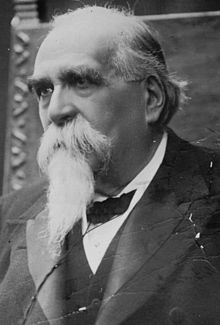Luigi Luzzatti
| Luigi Luzzatti | |
|---|---|
 |
|
| 20th Prime Minister of Italy | |
|
In office 31 March 1910 – 30 March 1911 |
|
| Monarch | Victor Emmanuel III |
| Preceded by | Sidney Sonnino |
| Succeeded by | Giovanni Giolitti |
| Personal details | |
| Born |
11 March 1841 Venice, Kingdom of Lombardy–Venetia |
| Died | 29 March 1927 (aged 86) Rome, Italy |
| Nationality | Italy |
| Political party | Historical Right |
| Religion | Judaism |
Luigi Luzzatti (11 March 1841 – 29 March 1927) was an Italian financier, political economist, social philosopher and jurist. He served as the 20th Prime Minister of Italy between 1910 and 1911. He was the first Venetian and second Jewish Prime Minister of Italy after Alessandro Fortis, although his predecessor Sidney Sonnino was of partial Jewish ancestry.
Luzzatti came from a wealthy and cultured Jewish family and built a reputation as a social reformer dedicated to raise the working classes from ignorance and poverty. He is remembered being the founder of the Italian credit union movement and for his book Dio nella libertà (God in Freedom), in which he advocates religious tolerance. This provoked an exchange of correspondence between him and Benedetto Croce.
Luzzatti was born of Jewish parents in Venice on 11 March 1841. After completing his studies in law at the University of Padua, he attracted the attention of the Austrian police by his lectures on political economy, and was obliged to emigrate after starting a mutual aid society among gondoliers. In 1863 he obtained a professorship at the Milan Technical Institute; in 1867 he was appointed professor of constitutional law at Padua, whence he was transferred to the University of Rome.
Gifted with eloquence and energy, he popularized the economic ideas of Franz Hermann Schulze-Delitzsch in Italy, worked for the establishment of a commercial college at Venice, and contributed to the spread of people's banks on a basis of limited liability throughout the country. In 1865 he founded the Banca Popolare di Milano in Milan, the second cooperative bank in Italy (the first one was the Banca Popolare di Lodi). The popular banks, modelled after the credit unions Schulze-Delitzsch had introduced in the 1850s, aimed to provide credits to peasants, small shopkeepers and artisans whose only option for capital had been pawnbrokers or usurious moneylenders.
...
Wikipedia
